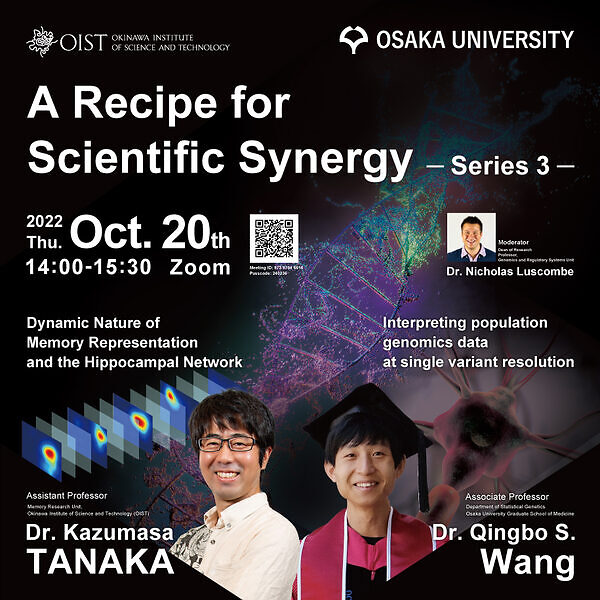A Recipe for Scientific Synergy Series 3 by Dr. Kazumasa Tanaka and Dr. Qingbo S. Wang

Date
Location
Description
Summary:
OIST and Osaka University have been building a healthy relationship.
Speaker, Title and Abstract:
Dr. Kazumasa Tanaka, OIST
Title:"Dynamic Nature of Memory Representation and the Hippocampal Network"
"Memories are encoded through long-lasting changes in the network of the brain. These memory traces can interfere with each other and therefore lead to instability of the representations. Indeed, a previous study discovered that instability is preferentially embedded within spatial maps in memory engram cells in the hippocampus even though their activity is still functionally linked to memory-relevant behaviors (Tanaka et al., 2018). Notably, higher instability of place cells is often observed in aberrant network states caused by various factors, including aging, stress, or epileptic seizure, which cause memory impairments. These studies highlight two distinct types of instability leading to the opposite outcomes of hippocampal memory. In my talk, I will introduce our unpublished studies aiming at 1) elucidation of neuronal underpinning that survives extreme plasticity yet supports memory and 2) development of a novel approach to reset the aberrant network state. These studies will provide fundamental insight into physiological and pathological instability in the neuronal network."
Dr. Qingbo S. Wang, Osaka University
Title:" Interpreting population genomics data at single variant resolution"
Although genome-wide association studies (GWAS) have identified large numbers of regions in the genome associated with complex traits, elucidating truly causal variant(s) at single variant resolution remains challenging, since each “region” typically contains thousands of variants in linkage disequilibrium (LD).
In this talk, I will introduce three approaches to prioritize causal variants, enabling characterization of their functions in the context of human biology:
i. Utilizing the genome Aggregation Database (gnomAD) for variant interpretation from population frequency data.
ii. Estimating the probability of a variant being causal to a phenotype under sparse model (statistical fine-mapping).
iii. Functionally-informed fine-mapping utilizing deep-neural network based epigenetic features.
Finally, I will discuss recent application of statistical fine-mapping on multi-omics data from COVID-19 infected individuals including 359 severe and 106 non-severe cases, highlighting the presence of COVID-19 severity-interaction expression quantitative loci (ieQTLs).
Moderator:
Dr. Nicholas Luscombe, OIST
Zoom:
- https://oist.zoom.us/j/97397046616?pwd=d2tuanNOeFUwQXZWejB2UW5ZNVA4dz09
- Meeting ID: 973 9704 6616
- Passcode: 240236
Attachments
Subscribe to the OIST Calendar: Right-click to download, then open in your calendar application.





